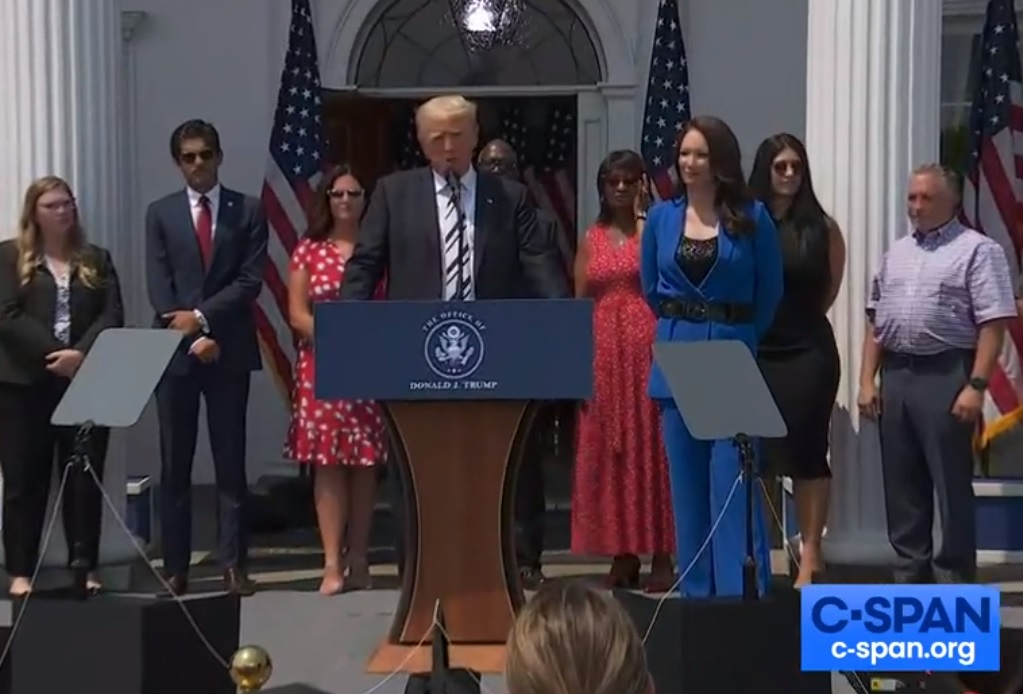Donald Trump Sues Big Tech
Continues attacks over alleged bias
The smarter way to stay on top of the multichannel video marketplace. Sign up below.
You are now subscribed
Your newsletter sign-up was successful

Former president Donald Trump is the lead representative in a class action suit against the "Big Tech" giants including Facebook, Google and Twitter, as well as their respective CEOs Mark Zuckerberg, Sandar Pichai, and Jack Dorsey.
The former president in a setting staged to more than evoke the White House said that the federal government "has essentially deputized social media platforms to become the de facto censorship arm of the U.S. government."
The suit, filed in the U.S. District Court for the Southern District of Florida, seeks an "immediate halt" to their "shameful censorship" of the American people, the former president said in a press conference announcing the suit, which he called a "very beautiful" development for free speech, which he said was a right granted by God, calling the suit a vital initiative.
He said he had assembled some great tobacco lawyers to make the case.
Also Read: House Weighs In on 'Historic' Big Tech Antitrust Bills
The suit was filed in conjunction with the America First Policy Institute, which was co-founded by institute chairman Linda McMahon, Trump's former head of the Small Business Administration and former CEO of WWE.
As President, Trump went after edge providers for perceived conservative bias, particularly Facebook and Twitter's de-platforming of his accounts after concluding his statements about protests and the elections were potentially dangerous.
The smarter way to stay on top of the multichannel video marketplace. Sign up below.
Trump said the bans were not fair. "If they can do it to me they can do it to anyone," he said.
Trump said free speech was under attack from Big Tech giants working with government, the mainstream media and that other political party to silence and suppress the views of the American people. "They banned the wrong side," he said.
Asked if he would consider settling the case, Trump said he didn't plan or expect to but he did not rule it out.
"Everything in these complaints is preposterous, which should not come as a surprise given Trump's affinity for filing frivolous lawsuits," said Andrew Jay Schwartzman, senior counselor to the Benton Institute for Broadband & Society.
"The fact that platforms talk to the government, and even cooperate on taking down speakers who violate the law or threaten national security does not make them instruments of the state," he said. "Far from being in the pocket of the government, the Justice Department and FTC are suing Facebook and Google. The difference is that those cases might have merit."
“Regardless of what one thinks of former President Trump, or his use of social media, the lawsuits he filed today against Twitter, Facebook, and Google’s YouTube are not frivolous," said Free State Foundation President Randolph May. "They claim that the immunity from liability granted to social media companies by Section 230 of the Communications Act, in effect, converts these private firms into ’state actors’ for First Amendment purposes because the immunity grant amounts to a delegation of authority by Congress that facilitates the companies’ censorship actions. If the state action theory is correct, then the Big Tech companies would not be able to censor posts — or de-platform persons — based on the content of their lawful speech.
"In his recent Biden v. Knight First Amendment Institute concurring opinion, Justice [Clarence] Thomas lent credence to the 'state actor' theory upon which Trump’s lawsuit is based, and other respected scholars have done so as well," said May. He said that while he was not convinced Sec. 230 makes private companies into state actors, but says if the suit reaches the discovery phase, "Trump could uncover a trove of emails from various congressional officials urging the social media companies to take certain actions which the firms quickly took. That would make the case even more interesting, and the claim stronger."
Contributing editor John Eggerton has been an editor and/or writer on media regulation, legislation and policy for over four decades, including covering the FCC, FTC, Congress, the major media trade associations, and the federal courts. In addition to Multichannel News and Broadcasting + Cable, his work has appeared in Radio World, TV Technology, TV Fax, This Week in Consumer Electronics, Variety and the Encyclopedia Britannica.

